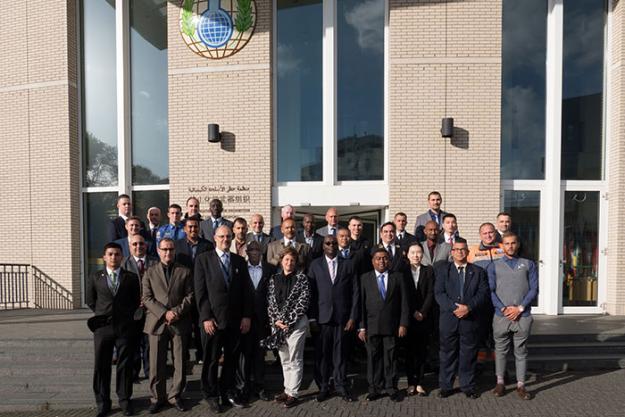
Participants from the 6th Edition Assistance and Protection Training, which was held in The Hague from 6-13 September 2017
THE HAGUE, Netherlands – 19 September 2017–Trainers from 21 Member States of the Organisation for the Prohibition of Chemical Weapons (OPCW) learned how to better identify and target trainings on assistance and protection against chemical weapons through a specialist course run by the OPCW at its Headquarters in The Hague from 6-13 September 2017.
The sixth edition of this training-of-trainers course was conducted by staff from the Assistance and Protection Branch and OPCW inspectors.
In his opening speech, OPCW’s Director of the International Cooperation and Assistance Division, Mr Hamza Khelif, expressed, ‘’It is my hope that this unique training provides participants with more skills to disseminate knowledge related to management and response to incidents involving chemical warfare agents’’.
The programme focused on helping participants identify teaching methodologies that will enable them to become more effective trainers. The course was divided into theoretical and practical segments, including table-top exercises.
Twenty-three attendees represented the following OPCW Member States: Algeria, Angola, Brazil, Bulgaria, China, Colombia, Costa Rica, Ghana, India, Italy, Kenya, Malaysia, Mali, Panama, Peru, Philippines, Poland, Republic of Korea, Sri Lanka, Sudan, and Ukraine.
This course is part of the OPCW’s activities to implement Article X of the Chemical Weapons Convention (CWC), which concerns assistance and protection against chemical weapons.
The training-of-trainers approach helps ensure sustainable and efficient use of resources for capacity building. This course is part of the OPCW’s Instructor Development and Exchange Programme, which focuses on building and exchanging knowledge, skills and protocols in the area of assistance and protection.
Background
As the implementing body for the Chemical Weapons Convention, the OPCW oversees the global endeavour to permanently eliminate chemical weapons. Since the Convention’s entry into force in 1997 – with its 192 States Parties – it is the most successful disarmament treaty eliminating an entire class of weapons of mass destruction.
Ninety-six per cent of all chemical weapon stockpiles declared by possessor States have been destroyed under OPCW verification. For its extensive efforts in eliminating chemical weapons, the OPCW received the 2013 Nobel Prize for Peace.
